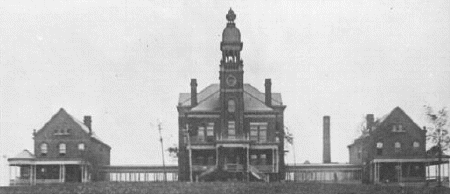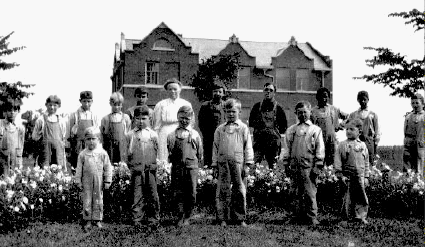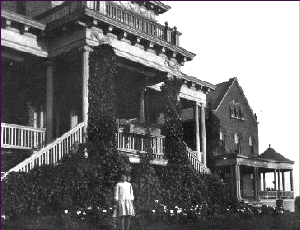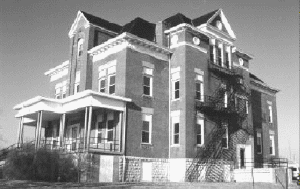Below is
the home as it appeared after construction with the tunnels leading to the girls’ and boys’ dormitories on either side
of the
building. These side
buildings have since been torn down and the main structure altered.

Have you ever been inside an old house and wondered - if these
old walls could talk, what stories would they tell? A tour through the stately old
Children's Home compels one to ask just that question. If you listen closely enough, you
can almost hear the laughter of the children mingled with the staccato issuance of orders
by the matron. The voices represent over 800 children whose lives were improved - and in
some cases saved - over the 79 years the Home was in operation. But those stories can be
told more eloquently another day by those who experienced the atmosphere of the Home. What
about in the beginning? What circumstances compelled our citizens to build such a
magnificent structure? Her story is one born of tragedy and the resulting commitment of a
community to address the problem.
After the guns of the Civil War fell silent, 300 Shelby County
families were feeling the effects of the loss of a loved one. The war, combined with short
life expectancies caused by diseases such as cholera and smallpox made children orphans at
an early age. The Ohio General Assembly passed legislation authorizing the construction of
children's homes in 1866. Although surrounding counties soon constructed homes, it would
be more than 30 years before Shelby County followed suit.
In the
meantime, what about the little children who had no parents? No one seemed to care. If no
relatives were available to take them in, less than satisfactory arrangements were made
elsewhere. For years, a number of the children were kept at the Shelby County Infirmary,
the home for destitute and insane adults. No one intervened on behalf of the children. .
After Logan County completed its home, no one in Shelby county stepped forward on behalf
of the children to suggest the construction of a home for them.
On June 26, 1892 a county Board of Visitors
was appointed by Judge Richie to tour all charitable institutions and report yearly
concerning their condition. On June 6, 1893 the Board rendered its verdict to the county
commissioners: Shelby County needed a children's home- and its construction should be a
top priority. Politics reared its ugly head, however. Republicans backed the issue, which
meant the Democrats were of course opposed. A stalemate appeared inevitable.
In the early 1890's, the
General Assembly passed a law forbidding just what Shelby County was doing: housing
children in an Infirmary. The Commissioners were faced with a mandate eerily similar to
the one with which Sheriff Schemmel was recently confronted: comply with the law and make
other housing arrangements for those in your care. The commissioners took steps to
transfer 16 children from the Infirmary to the Logan County Children's Home at a cost of
$1.75 per child per week. Now, money was also an issue. Among those shipped to
Bellefontaine were Shang Effie May, Frank and Fred Williams, and Carey and Ida Barbee.
Some
were left behind. Among them: little 3 year old Evelyn Wyford. Her mother was in the
insane ward at the Infirmary. After some thought Superintendent Guthrie decided to
advertise beautiful, blond haired Evelyn for adoption. Mr. and Mrs. Albert Strickland of
Middletown applied and the adoption was completed. Evelyn Wyford left for a strange town
with her new parents.

One can hardly imagine the
shock and revulsion of those who picked up the July 21, 1893 edition of the Shelby
County Democrat and read what had become of little Evelyn. Word had just been received
from the Cincinnati Enquirer that city officials had entered the Strickland home
upon the complaint of neighbors who heard the anguished cries of a child in pain. The Democrat reported that "The poor little thing had apparently been the target of insane
rage, for its tender body was marked...most horribly from head to foot, and around its
throat were the prints of strangling fingers."

Supt. Guthrie rushed to the scene but
nothing could be done. Mr. Strickland claimed he was afraid to interfere. Mrs. Strickland
disappeared and was never found.
A sense of shame settled over the
community. Government and community leaders were determined to act so that nothing like
that would ever happen again. An Advisory Committee consisting of A.J. Hess, S. L. Wicoff
and S.J. Hatfield was appointed by new Judge J.
D. Barnes. Soon, representatives were touring children's homes throughout the state
with the intention of building a children's home that would be "the finest in the
state." There were of course some obstacles
along the way. A levy issue to raise funds was placed on the ballot and passed on November
10, 1893. (The Republicans of course claimed victory). The county commissioners also
struggled with site selection. Competing were the McCracken, Fielding, Doorley, Duncan and
Orbison farms. After consulting landscape architect Herman Haerline of Cincinnati, the 142
acre Duncan farm was chosen for its commanding view of the river and the city. A dispute immediately ensued after the
commissioners announced their intention to construct a new road to the home to be known as
the "Children's Home Pike." Area residents were bitterly opposed, complaining
the road would be "very expensive and of doubtful utility." It is now
considered one of the most beautiful drives in the county.
An architect firm from Columbus was selected and plans were meticulously prepared.
Preparations were made for the opening of bids on December 7, 1894. Eleven bidders arrived
from across the state. Excitement ran high as the bids were opened. The lowest two bidders
were Sidney builders Snyder and Altenbach.
Because of the combination bidding that was allowed, confusion immediately arose as to
which was the lowest bid. Both builders engaged counsel and the dispute was quickly
resolved.
Casting a cloud
over the bid opening was the sad news received the same day. Frederick Woodruff, the young
son of Bertha Woodruff of Sidney died in the Logan county home on August 29 after his
transfer there from Sidney. Incredibly, Infirmary officials in Sidney were not notified
until December 7. County officials were more determined than ever to properly provide for
the children in this county.
County officials assembled on the top of the
beautiful and wind swept hill that was to be the site of the home for the laying of the
cornerstone on May 31, 1895. A box containing appropriate documents was placed behind the
cornerstone. On the minds of those present must have been Evelyn Wiford and Frederick
Woodruff. This would be a children's home to honor their memory. It would stand as a
hallmark to the commitment of Shelby County to her children for future generations. Over
two years would pass before the home was completed. Thirty-five children arrived by train
from Logan County on October 15, 1897 to occupy their new home. Our community had met its
commitment to the children. A new day had begun.

The home as it appeared
in 1996
Photo courtesy of Tom Homan.
[ Back to Downtown Index ] |

